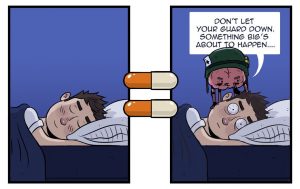We’ve all been there: either we’ve procrastinated by leaving all of our studying to the last day or, we’ve forgotten to do a paper until the night before. This is often where study drugs are introduced.

Prescription pills for Adderall by Alex Dodd
The Basic Facts
Adderall is a study drug, also known as a smart drug that is often prescribed to individuals with Attention Deficit Hyperactivity Disorder (ADHD). However, like many other prescription drugs, people have been using Adderall for purposes such as recreation and studying. As reported by the National Survey on Drug Use and Health, roughly 6.4 percent of college students have been found to use Adderall for recreational purposes. Particularly, most students think that Adderall will strengthen their ability to study. Although an Adderall prescription must be obtained from a doctor, people still have access to this drug from other sources. A 2016 Recovery Brands survey showed more than 60% of individuals aged 18-28 get their hands on doctor-prescribed Adderall through family, classmates and street dealers.

Adderall cartoon figure by Willie Muse
How It Works
This drug works by increasing the amount of dopamine and norepinephrine in a user’s brain. Dopamine, also known as the pleasure centre of the brain, is responsible for our fight-or-flight response which controls focus, clarity and alertness. Norepinephrine helps to make all of these behaviours last longer. Combined, these two neurotransmitters allow the user to stay more focused, be more alert, pull all-nighters and be more efficient while studying.
The Big Picture
Nonetheless, the side effects of taking Adderall can be very detrimental to users. Some symptoms include irregular heartbeats, high blood pressure, nausea and loss of appetite. There has been a recent study showing correlation between this study drug and long term memory loss. Additionally, just like with any other drug, there is potential to become addicted to Adderall. According to the Drug Enforcement Administration’s Schedule II list of substances, Adderall is classified as a drug with a high potential for abuse that can lead to physical and psychological dependence.
Overall, study drugs may help you stay awake in order to cram information before an exam, but are the “benefits” worth the negative effects? Definitely no.
Basima Spindari
